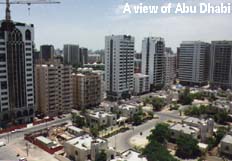How information is controlled
The flow of information within the country is tightly controlled though it has become more and more difficult to prevent people being in the know after satellite channels were allowed to mushroom after the Gulf War of 1991. Most of the emirates have their own radio and TV stations and what is dished out depends on many factors.
Dubai and Abu Dhabi have Arabic and English channels while Sharjah and Ajman have an Arabic channel apiece. Dubai also has a 24-hour satellite channel with fairly anodyne programming. A fair amount of the programming has to be oriented towards Asians as they are the majority of the populace but American and British serials are common as well. Censorship is not very logical and thus one sometimes sees programmes which are supposed to be banned; the same programme may not be shown on a channel in another emirate. A colleague of mine had the funny experience of taping some episodes of the British serial 'Allo 'Allo off Dubai's TV channel and having them impounded in Dubai on his return from Sri Lanka; he was told that the programme was a banned one! Such situations are common.
The organisations which feel the
censor's clammy hand the most are the
English newspapers; there are four in all, the Emirates News from Abu
Dhabi
(government-owned), Khaleej Times (owned by an Iranian family which has
become
naturalised) and Gulf News (owned by a son of the soil), both published
from
 Dubai, and
The Gulf Today (again owned by a son of the soil) which is published
from
Sharjah. The company which brings out the last-named paper publishes
what
is deemed the boldest Arabic daily from the Gulf, Al Khaleej, a
broadsheet
which is daring by Arab standards.
Dubai, and
The Gulf Today (again owned by a son of the soil) which is published
from
Sharjah. The company which brings out the last-named paper publishes
what
is deemed the boldest Arabic daily from the Gulf, Al Khaleej, a
broadsheet
which is daring by Arab standards.
All rulers have to be given the honorific "His Highness" in the media and every two-bit official is mighty finicky about his designation. Given the fact that a large number of the names can only be distinguished by specifying their father, it is a difficult business keeping on top of this! The best way I can illustrate this is by citing the case of two sheikhs from Sharjah -- one named Sheikh Faisal bin Khalid Al Qasimi and the other Sheikh Faisal bin Khalid Mohammed Al Qasimi. Many sub-editors on the paper I worked for kept getting the two men's names muddled up and attributing one man's designation to the other. Finally, things came to such a pass that the news editor was called to Sharjah (both men are from this emirate) and made to apologise.
The official news agency, Emirates News Agency, (one normally refers to it as Wam, the Arabic acronym) is a joke. News is issued in Arabic and some of it is then translated into English and sent on the wire -- by teleprinter in this day and age! The format of all the stories falls into certain set categories; thus officials generally discuss "bilateral relations and matter of mutual interest". The news issued about Gulf states is even funnier; rulers are always referred to as brothers though some of the states in the area still have unresolved territorial problems. The UAE is part of a six-state Arab Gulf Cooperation Council (the other five members are Saudi Arabia, Qatar, Bahrain, Oman and Kuwait) and the heads of these states are referred to as brothers. They do not see eye to eye on numerous issues but this does not prevent Wam from trying to project a benign air of absolute harmony whenever the six meet. Even a slanging match just short of fisticuffs is referred to as a "passing summer cloud"!!!
Censorship ensures that books are regarded as potentially subversive and are thus difficult to obtain. What can be bought at the numerous bookstores are timid novels; some privately-run lending libraries may house spicier stuff donated by an expatriate with a taste for the stuff. I picked up a number of books that would have raised the censor's hackles at one or the other of the little second-hand shops which cater to the bibliophile.
But then, people are not in the country to read and expand their horizons. They are there to make money, as fast as possible in what is basically an inhospitable clime. Little things like not being able to read this or that do not bother the majority. Those who are bothered about it can always find some way of dulling their senses.